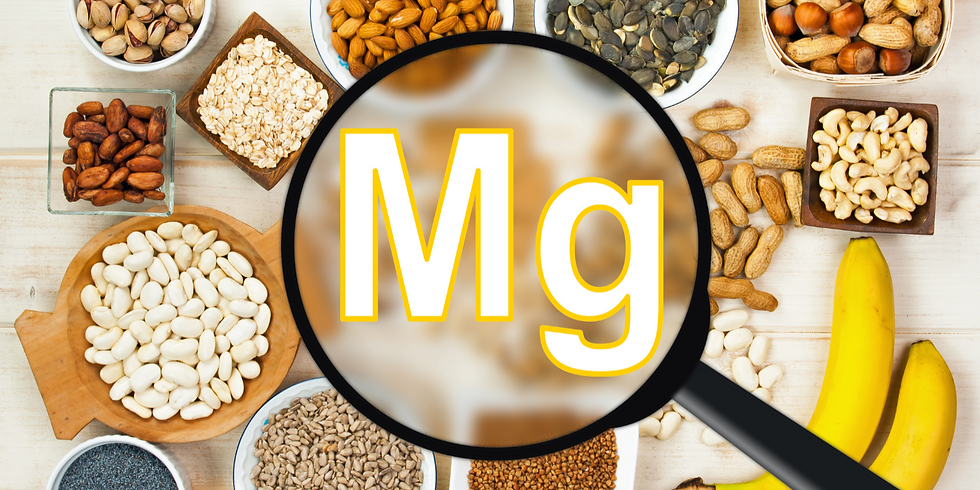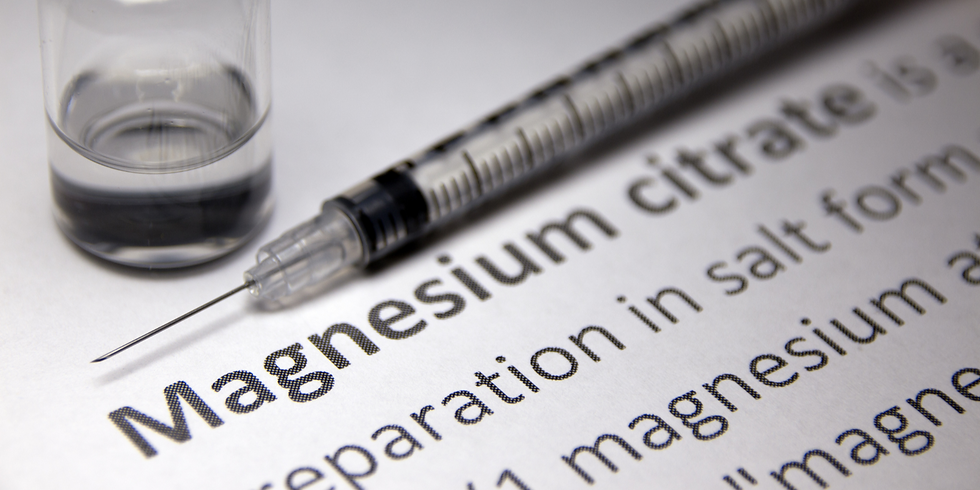Headaches and Twitching Eyes: You Might Have This Nutrient Deficiency
- Marcie Vaske, MS, LN, CNS

- Apr 12, 2024
- 6 min read
Updated: Apr 26, 2024
Video Transcript:
Have you ever experienced that little eye twitch that might happen and wonder why is that just happening and it's totally out of the blue?
Or you might be experiencing more headaches, just these underlying chronic headaches that really aren't attributed to much and wondered what is going on?
Today I'm going to answer the question of are headaches or eye twitching connected to a nutrient deficiency?
Headaches and Twitching Eyes You Might Have This Nutrient
Now, while headaches and eye twitching can be from a variety of things, nutrient deficiencies is often a common cause, and our body needs to have the optimal amount of nutrients to function optimally.
And so what could be underlying these headaches or eye twitching?
So today I'm going to talk about the connection of nutrient deficiencies with these symptoms as well as what nutrients are particularly related to eye twitching or more headaches, as well as just some information on nutrition and how you can incorporate more of these nutrients into your daily diet.
My name is Marcie Vaske and I am a functional medicine nutritionist with Flusso Nutrients and at Flusso Nutrients. We really pride ourselves on educating everybody about supplements. There's so many supplements out there and it can get confusing and overwhelming when trying to choose the right one for your particular symptom or thing that you want to work on. And so by giving some more information on supplements, this can lead you down the right path for helping you have optimal health.
So let's dig back into our topic.
Headaches and Magnesium
Headaches and eye twitching really can come from a pretty common nutrient deficiency, which is magnesium.
Magnesium should be an abundant nutrient in our body, but oftentimes it's not.
Magnesium deficiencies are connected to muscle twitching can be connected to migraines or even just tension because magnesium helps to calm down our muscles.
In addition to that, magnesium plays a very vital role in the production of our neurotransmitters and our neurotransmitters.
If they're low, we can have a more sensitive feeling to pain, which would increase a headache as well as muscle tension.
Magnesium Deficiency + Muscle Twitching
Like I said, magnesium calms our muscles. Of course, involuntary muscle contractions now similar to magnesium, vitamin B12 deficiencies can also cause both of these symptoms.
And vitamin B12 is very critical for neurology as well as keeping our nerves healthy. Therefore, if you have a vitamin B12 deficiency, you may feel like you have more headaches or even feeling that I twitching.

In addition to vitamin B12, we also have vitamin D that's very important.
And also vitamin B two, which is riboflavin. And these two are also critical in our body for lots of things.
But if we're low in them, you may have more muscle twitching, you may have more headaches.
And so you can see it's not just one nutrient deficiency that might be causing some of these symptoms, but a few of them now, those types of nutrients, magnesium, vitamin B12, vitamin D, and riboflavin, which is vitamin B2, eye twitching and headaches are just some of the symptoms.
And so if you're trying to figure out which one you may have, there's other signs and symptoms.
For example, if you have a vitamin D deficiency, bone pain is really common when it comes to having a really low vitamin D as well as fatigue.
And also with vitamin B12, you might have more irritability or poor concentration, and those vitamin B12 and magnesium are kind of the same in that.
And so it's really important to dig in a little bit further.
Eye Twitching Remedies
If you're just having eye twitching and you have no other symptoms and you're thinking, well, I don't know which one to try. I mean the most common thing to do would be first get a vitamin D lab.
And then if you're low, and oftentimes magnesium is another very common nutrient that is low in our system because magnesium is water soluble and oftentimes we're just ridding it and we're not taking in enough.
So those are two, maybe the more common ones, but it doesn't mean that the other ones aren't plaguing you as well.
So of course, making sure that you're eating a whole foods diet is going to be super important. If you're eating a lot of processed packaged foods, you're going to strip your nutrients much more quickly because first of all, you're not getting enough of the nutrients that you need because those kinds of foods don't really have what you need.
And also when we have more processed packaged foods, they're much more inflammatory and our body just begins not working as well.
And so to keep up optimal health and get the nutrients you need, you want to make sure that you're adding in foods that are high in magnesium, so like dark leafy greens or nuts and seeds or even foods high in B12, which are going to help support that neurotransmitter production and are nerve endings.
And so foods that are helpful there is going to be foods like protein.
So animal proteins have tons of B12 in it, so it's a good idea to add that. In addition, making sure that you're getting in that B two as well as vitamin D.
Of course, if you think you're not quite getting in the nutrients you need within your diet because there's just not, you're not getting enough of those whole foods or you have some food sensitivities that reduce the amount of vegetables maybe you're eating, for example, you can always supplement.
Supplements are a great way to support and boost up those initial deficiencies, getting you on the right track. I always say that you can't outs supplement a bad diet, that's number one, but you can at least start moving your food into a healthier place and taking a supplement that can help boost up those deficiencies.
Taking magnesium supplements is super easy.
Magnesium glycinate is the most absorbable form of magnesium and it's usually recommended to take 200 to 400 milligrams.
And I always say take that in the evening or even before bed because not only will it help to alleviate your headache or your eye twitching, but magnesium is amazing for sleep.
And with B12, if you aren't able to get enough animal protein in, therefore maybe being getting a little bit lower in B12, take a B12 supplement, methylated B12 is going to be the best form to take.
And roughly 5,000 micrograms per day is a good amount to start with.
And of course with vitamin D, you can always take a vitamin D. And of people who live in the Northern Hemisphere, as we always talk about, we probably don't get enough sun, therefore taking vitamin D is going to be really helpful.
And a good place to start with that is going to be 5,000 IUs per day. And you always want to make sure that you take your vitamin D with a meal.
And of course, taking vitamin B two that you can take in just like a B complex even, and the amount that's in there is going to be enough to boost you up to the next level.
Supplements do not have to be taken forever, but until you get feeling better and you rid your symptoms and you're in a good place, then I recommend taking them.
So I hope this helped you understand just a little bit of symptoms that can be expressed in everyday symptoms that we feel and see if you are getting a lot of headaches, start looking into just the basic things.
Is it just not enough magnesium?
Are you having, is your vitamin D too low or eye twitching?
Same thing because our body, as I always talk about, is always talking to us.
It's trying to tell you what's wrong. It's just that we have to listen and read the symptoms and the signs.
So I hope this helped. And as always as well, make sure you talk to a literate practitioner in supplementation to make sure that you're taking what you need and what is going to work best for you, as well as not being contraindicated with any of your medications.
So hopefully now you'll start feeling better and get rid of those headaches and eye twitching.
Thanks for watching. Bye-Bye.
Check out the high-quality supplements we discussed in this video - links below for your convenience!
1) Magnesium Glycinate: https://flussonutrients.nutridyn.com/magnesium-glycinate
2) Magnesium L-Threonate: https://flussonutrients.nutridyn.com/magteinr
3) Vitamin B12: https://flussonutrients.nutridyn.com/b12-pro
4) Vitamin D Test: https://flussonutrients.nutridyn.com/vitamin-d-test
5) Vitamin D3 Liquid: https://flussonutrients.nutridyn.com//micellized-d3
6) Vitamin D3 Capsule: https://flussonutrients.nutridyn.com//d3-5000-with-k2
7) ALL PROFESSIONAL QUALITY SUPPLEMENTS: https://flussonutrients.nutridyn.com




Comments